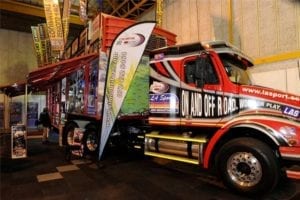Truck Competence has been a dedicated component of Automechanika trade fairs worldwide for more than four years and featured at the fourth staging of the biennial Automechanika Johannesburg at Expo Centre, from May 6-9.
Exhibitors that displayed products or services for the truck and bus industry had their stands identified with an orange Truck Competence logo, but the highlight of this initiative this year was an insightful transport conference on May 8. The well-attended Focus conference had an interesting array of speakers who covered a variety of topics that were of real value to those involved in the transport industry. Adrian van Tonder, the Senior Manager RTMS and PBS at Barloworld Logistics, kicked off with an in-depth dissertation on the value of the Road Transport Management System (RTMS) in controlling fleet costs and enjoying the benefits of better driver behaviour and vehicle reliability due to regular servicing. Van Tonder said there was strong growth in the acceptance of the RTMS and now 146 fleets, comprising more than 8000 vehicles, were using the system. He also stressed the need for fleet managers to understand driver fatigue and how to monitor and control it as well as the importance of correct eating habits and diet for the drivers. The subject of Performance Based Standards (PBS) or Smart Trucks was presented by an expert on this subject in Paul Nordengen, Research Group Leader, Network Asset Management Systems, CSIR Built Environment. Here again it was good to hear how this abnormal operating system was growing. There are now 107 PBS trucks – excluding car transporters – operating in SA in a discipline that was launched in 2007 and has RTMS compliance as a pre-requisite. According to data collected the use of these extra long rigs had resulted in 75000 less trips being required to move the same loads as would have been the case with normal-size trailers, while there was a saving of 14% in fuel by those trucks operating in the timber industry. Accident rates were also notably lower.Nordengen said a great deal of work had been undertaken to develop car carriers as PBS units and there are now 200 of these combinations operating on SA roads, with the benefit of far less tail swing when turning as well as being a more stable rig.
Jim Ward, the Technical General Manager of Unitrans Logistics, spoke in his personal capacity and gave an excellent – and often humorous – account of operating a transport fleet in the unique conditions of the African continent. He said it was a case of balancing First and Third World needs and operating systems, with clear communication the vital link in dealing with people of various cultures. He also stressed the selection of the correct type of trucks for use in Africa, with the accent on relevant technology and ruggedness. The fourth speaker provided plenty of food for thought and some worrying statistics. He was Loane Sharp, an economist at the Free Market Foundation, who spoke on the future of labour in SA. He said that besides the increase in unemployment, labour productivity was the lowest since 1970 when records of this measurement were kept for the first time. Interestingly the employment peak in SA had been reached in 1988 and since then unemployment had grown. The biggest declines have been in the mining and agricultural sectors which had been the backbone of the SA economy for many years. Sharp questioned the massive rise in employment in the public sector, which had grown from 1.3-million people in 1995 to the current level of 3 million and placed a big burden on the economy. Another interesting point made by Sharp was the fact that union membership is declining and there are now more union members in the civil service than in the private sector. Overall one in four workers in SA is a union member, but in the private sector the ratio is one union member for each eight workers. The conference ended with the announcement of the results of the 2015 comparative truck test as well as a detailed explanation by Martin Damman, the Managing Director of HTM TransSolve, of the controls employed and the method by which the results were computed.





